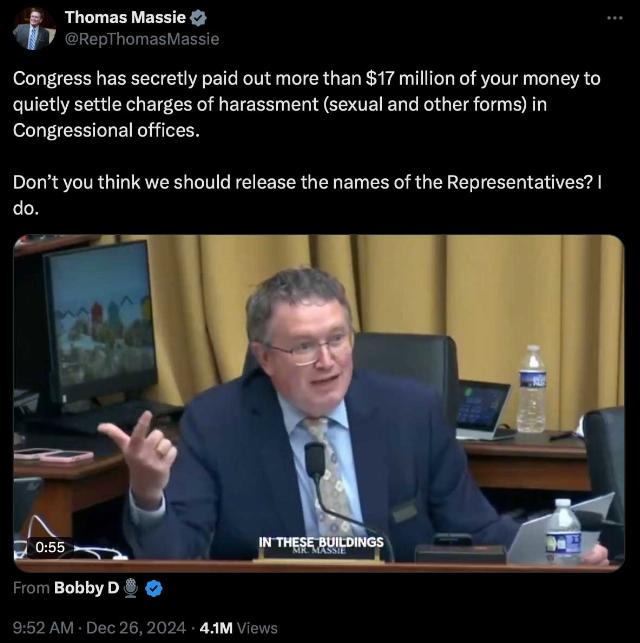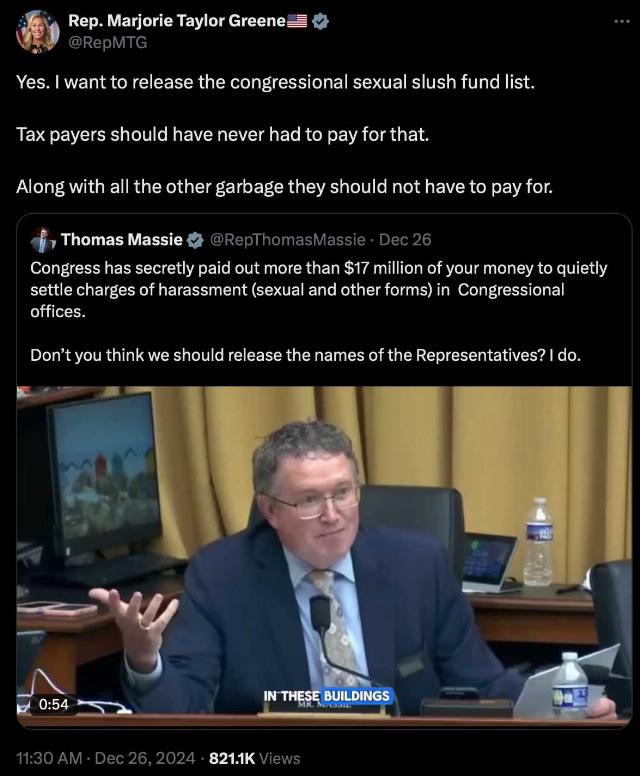Uncovering Congress' sexual secrets
I’m curious: where in the Constitution or its amendments is the “taxpayers have to cough up the money to pay for congress critter’s sexual harassment of aides and interns” clause? In the many times I’ve read the Constitution, that’s one that has eluded me. Recently, however, some in Congress have seen fit to start asking questions like that, including Thomas Massie and Marjorie Taylor Greene:

Graphic: X Screenshot
In light of this decision [the release of the Matt Gaetz investigation], Rep. Thomas Massie (R-KY) called for the Office of Congressional Workplace Rights to disclose the names of lawmakers who have benefited from over $17 million in taxpayer funds used to “quietly settle charges of harassment (sexual and other forms) in Congressional offices.” In a Thursday post on X, Massie asked, “Don’t you think we should release the names of the Representatives? I do.”
In November 2017, Axios reported, “Congress has paid out more than $17.2 million over the last 20 years to cover 268 settlements on Capitol Hill, according to the Office of Compliance, which was set up in 1995 under the Congressional Accountability Act. In 2002 and 2007, those tallies topped several million dollars.” If the payouts totaled $17.2 million in 2017, it’s reasonable to assume the amount has grown significantly over the past seven years.
It's more than reasonable to assume that. It’s also likely the amount currently known is far, far less than the actual amount that has been paid out under the table.
As with all such allegations, it’s important no one assume a mere accusation is evidence of guilt. Common sense, which includes knowledge of human nature, tells us we really can’t believe all women. It’s also important to understand people, like President-elect Trump in the Stormy Daniels case, often settle rather than deal with the distraction and potential political and employment consequences of a trial. The problem is, we’re talking not about private money paying settlements, but taxpayer money. Why should taxpayers be responsible for the sexual misdeeds of others? Shouldn’t our elected representatives be held to a higher standard of behavior? Why are you laughing?
What’s the practical, constitutional argument for using taxpayer funds for such settlements? Are we to accept them as simply part of our legislator’s inevitable, reasonable expenses? We elect them expecting they’re not going to be able to keep whatever is in their pants in their pants? To be sure, men and to a lesser degree women in positions of wealth and power are easy targets for sex claims of all types. Rev. Billy Graham, for example, was careful never to be in the presence of women without witnesses, and he, to my knowledge, never had to fend off such accusations, but apparently our representatives aren’t so circumspect.

Graphic: X Screenshot
In the spirit of “physician, heal thyself,” perhaps the Congress could set up rules, even laws, that require each and every allegation of sexual misconduct implicating government property and/or time, be fully, independently investigated and the results made public. If innocent, there obviously would be no payout. If guilty, it would be up to the congressman or senator, not the taxpayers, to settle up, assuming the offense didn’t rise to the level of a crime, but that’s another issue. Because each house sets the rules that regulate behavior and can expel or refuse to seat members for violations of those rules, they could also establish hard and fast consequences for guilt. “He said/she said” situations are difficult, but it’s for that reason we have competent, independent and transparent investigations.
Requiring members of Congress to pay for their own sexual misdeeds would not only save taxpayer money, it might tend to moderate the sexual impulses that tend to manifest in the wealthy and powerful. Congressional aids and interns might find that a good thing. It should go without saying that what our elected representatives do when they’re not working and when they’re not in their offices or related properties is absolutely their responsibility. But again, House and Senate rules, or even a federal law requiring investigation and reporting of all such incidents would tend to reduce their number.
And no, this would not require the establishment of another huge federal bureaucracy like the Federal Bureau of Congressional Horndog Investigation (FBCHI), as entertaining as the inevitable TV series might be. There might be an already established agency with a professional investigator or two who might be pressed into service, unless, of course, the sheer volume of complaints is so high a FBCHI is the only recourse. Currently that’s 435 representatives and 100 senators, so maybe Hollywood might begin to think about casting…
It looks like DOGE is going to be busier than they thought, and Congress might have fewer future—ahem--distractions.
On a different subject, if you are not already a subscriber, you may not know that we’ve implemented something new: A weekly newsletter with unique content from our editors for subscribers only. These essays alone are worth the cost of the subscription.
Mike McDaniel is a USAF veteran, classically trained musician, Japanese and European fencer, life-long athlete, firearm instructor, retired police officer and high school and college English teacher. He is a published author and blogger. His home blog is Stately McDaniel Manor.
FOLLOW US ON
Recent Articles
- Public School Teachers: The Stupidest Creatures on the Planet
- The Activist Judges Who Think They Outrank the President
- Dismantling USAID Services in Africa
- There Are EVs And There Are Teslas. They Are Not The Same.
- Trump Didn't Kill the Old World Order -- He Just Pronounced It Dead
- Dems 2025: Stalingrad II or Keystone Kops?
- Go, Canada! Breaking Up Is Not Hard to Do
- Is Australia Set to Become a Security Threat for the United States?
- The Imperial Judiciary Of The United States
- Sanders and AOC: 100 Years of Socialism
Blog Posts
- The disturbing things that happen when you abandon Biblical principles
- In California, an anguished Dem base urges its politicians to be more crazy
- A new low: Leftist terrorists damage the Tesla of a woman in a wheelchair, leaving her with repair costs
- A Tale of Two Families
- ‘Gruesome’ trans-ing of animals is the key to fine-tuning trans ‘care’
- New report: NYPD officer accused of spying for the Chinese…from the same building as the FBI field office
- Quebec to ban religious symbols in schools?
- Joe Biden can help Republicans
- Low-hanging fruit is not enough
- Trump Makes Coal Great Again
- Israel’s appearance in the JFK files does not connect it to JFK’s death
- Waiting for an investigation of COVID-19 crimes
- Has Women’s History Month served its purpose?
- Democrats and their digging
- Obesity epidemic: Sometimes, the most obvious answer is on the table






